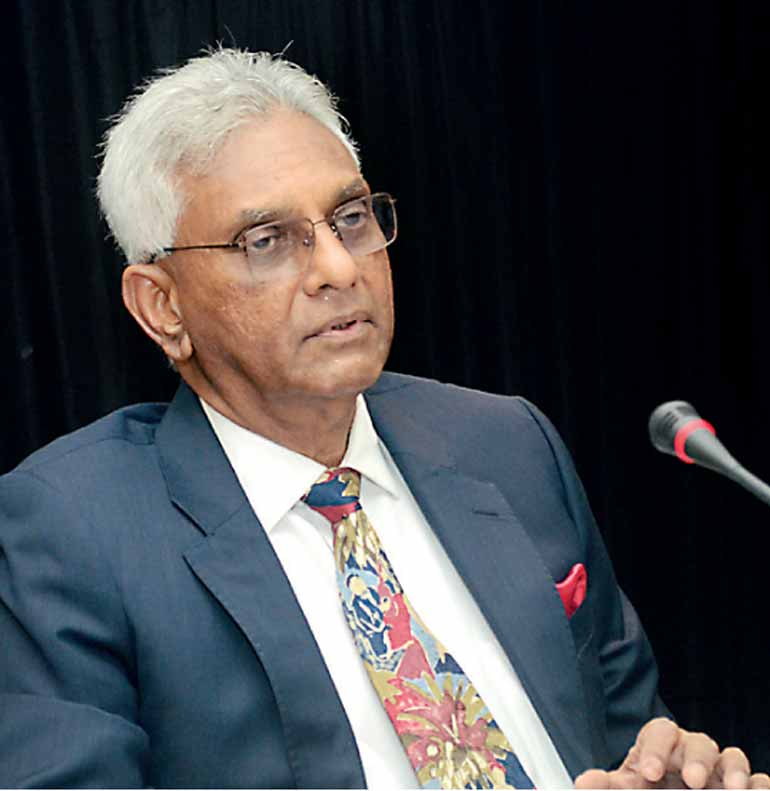Friday Feb 27, 2026
Friday Feb 27, 2026
Friday, 6 December 2024 00:00 - - {{hitsCtrl.values.hits}}

Palm Oil Industry Association President Dr. Rohan Fernando
– Pic by Shehan Gunasekara
By Janani Kandaramage
The Palm Oil Industry Association of Sri Lanka (POIASL) yesterday renewed its call for the Government to lift the ban on oil palm cultivation, insisting on its significant economic, environmental and strategic benefits during the association’s fifth Annual General Meeting (AGM).
Speaking at the event, POIASL President Dr. Rohan Fernando underscored the importance of engaging with the Government at the highest level to reconsider the ban, which he described as an “ill-conceived ad-hoc decision” lacking scientific basis.
“It must be reiterated that those responsible for banning oilpalm may not entirely agree that it was an ill-conceived ad-hoc decision, not based on any scientific evidence, and purely taken to satisfy the needs of a few personalities who were close to the former administrators. Many believe that at least the issue should have been examined carefully with advice from the Experts, before hastily imposing the ban. The Government is yet to take a decision on lifting the ban, despite the scientific evidence that oil palm is the most efficient vegetable edible oil and that more than 40% of the world demand is met by this golden crop.” he opined.
Palm oil imports and the cultivation of local oil palm were banned in April 2021 by former President Gotabaya Rajapaksa citing a Central Environment Authority’s report of 2018 which claimed that the cultivation of the crop affected the environment adversely. Cultivation was to be phased out over 10 years. In response to urgent requests from confectioners, for whom palm oil is a key ingredient, licensed imports were permitted in the same year.
He emphasised that palm cultivation could play a pivotal role in alleviating poverty through job creation across farming, processing and distribution whilst reducing reliance on imported oils, a critical step in preserving the country’s foreign exchange reserves.
Dr. Fernando also emphasised the necessity for collaboration with Palm Oil Associations of major oil producing nations such as Indonesia, Malaysia, and India.
“We are confident that the efforts of the association are beginning to see fruitful results. We are confident that there will be light at the end of the tunnel under the new administration, as food security, enhancing nutrition, poverty alleviation and achieving zero hunger are some of the key objectives of the new administration,” he noted.
Despite these obstacles, there is hope on the horizon as the POIASL has strategically designed a blueprint focused on lifting the ban.
Dr. Fernando said under the leadership of Prime Minister Modi, the Indian administration is also working on an accelerated expansion program of oil palm cultivation. Fernando believes that by forming a united front with international organisations and palm-oil producing countries, more pressure will be placed on the Government in overturning the ban.
“As many are aware, Prime Minister Modi of India has mandated India to plant up to three million hectares of palm oil, as a strategy for import substitution. India is one of the largest consumers of palm oil in the world and its demand for palm oil will double by the year 2030. The Indian Government’s stand is that the demand for edible oil cannot be sustained only by increasing imports, and these are the lessons that our administrators need to learn when addressing the economic issues of a nation. If the palm oil producing countries reduce exports, as done in Indonesia a few years back, there would be an enormous negative impact on several economies. Ironically Sri Lanka is the only country in the world to ban oil palm. Not a very healthy reputation, especially when its nearest neighbour India is expanding oil palm cultivation exponentially. Unfortunately, no one has taken account of the effects of the ban and its cost to the Country’s economy by importing edible oil to meet the edible oil requirements in the domestic market.”
Discussions at the Association’s AGM grazed on the baseless allegations against oil palm, and the need to strengthen the functions of the POIA during the year under review as a result.
The AGM of the POIASL concluded with immense optimism in a new political culture represented by the new administration that will take the necessary steps in lifting the ban and encouraging replanting as promised.
According to Environmental Impact Studies prepared by the POIASL, Sri Lanka’s vegetable oil demand has been steadily rising, prompting the Government to approve the planting of oil palm on 20,000 hectares in 2014 to meet an annual edible oil demand of 80,000 metric tons. Without the import ban, local production could have supplied at least 50% of the nation’s needs by 2025. However, despite imposing a ban on palm oil imports, the Government later allowed imports after industry lobbying, revealing inconsistency in its edible oil policies –supporting consumption but restricting local production.
In the present, reduced duties on coconut oil imports are costing Sri Lanka valuable foreign exchange. Expanding oil palm cultivation could have enabled the export of higher-value coconut products while meeting domestic demand for edible oil. Oil palm’s productivity is nearly four times that of coconut oil, and increasing coconut oil production would require more time and land, making oil palm a more efficient solution for both local supply and foreign exchange earnings.